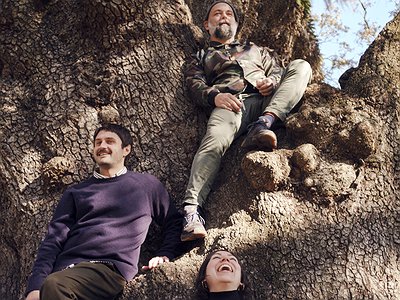In which way do you feel your identity concretely influences your creativity?
MARK: I’m not sure that it does to be honest. I identify as a cis gay man but if I let that completely influence my creative endevors I might produce mundane content and only attract others like me - that sounds like a nightmare. Though I also identify as a free spirit - if we view it from that perspective then I would answer differently.
BRETT: I think realizing you are a gay man instills a sense of liberation from the norm in you. I feel like that type of freedom, feeling that anything is possible if being a gay man is possible, has led me to test my limits and have agency as a creative person.
KATHI: Frankly, identity as a social concept can be an exhausting spiral when you’re trying to create anything that is an expression of yourself, with all your complexities and contradictions. It’s a fine line between wanting your voice heard as part of a specific group and being reduced to that identity only.
I’m a white woman, I’m half German and half Nicaraguan, with two native languages, so there’s somewhat of a feeling of in-betweenness. The tendency everywhere is to flatten people’s whole beings into binaries. In that sense, I think that anything I create is infused with a thirst for context and nuance, since those are the things that have helped me understand myself and other people.
Art can be an expression or celebration of identity, but it can also be an effort to establish new ones or break free from them. How would you describe your own approach in this regard?
BRETT: I think our motivation for organizing the types of parties we are known for stems from being unsatisfied with what the homogenized, mainstream clubs have to offer and more specifically what New Orleans nightlife had to offer by way of all night dance parties. New Orleans holds tight to its musical traditions based in the Blues, Jazz, and Rock n’ Roll. It’s a city known for all night debauchery but in the way of drinking at bars and attending live music events.
This hedonistic and debaucherous nature of New Orleans paired with a community of people that defy binaries who were excited for something fresh, proved to be fertile ground for re-inventing what nightlife could be in New Orleans with all night warehouse parties hosting local and traveling DJ talent outside of the mainstream.
There is a fine line between cultural exchange and appropriation. What are your thoughts on the limits of copying, using cultural signs and symbols and the cultural/social/gender specificity of art?
KATHI: Well, one could argue that DJing as an artform is based on cultural exchange and appropriation, since all we do is collect and play other people’s music. Most DJs make dancefloor edits of songs without asking the original artist and without any regard for copyright.
That being said, one of the obvious limits is borrowing cultural markers for your own self-aggrandizement and enrichment without giving anything back and being unapologetic about how offensive your behavior is - see this Dweller conversation highlighting the history of white techno producers making and selling music under an invented “Black” name and persona. Furthermore, racism is still a common experience for most Black DJs and partygoers in a white-dominated scene and at the club. So who is ultimately benefiting?
Something seems off about playing a stack of rare Afrofunk records back to a mostly white audience without reflecting on your role in that scenario. Energetically, it reminds of the curiosity cabinets of the 16th century in European courts, all filled with random objects plucked from the colonies, completely decontextualized and only there to serve their new purpose of pleasing the euro-gaze and elevating the owner’s status. I’m conjuring this extreme image to highlight that this sort of unawareness is part of our colonialist past as white people and it can permeate a lot of what we do.
If your livelihood is built on collecting and re-combining the music of marginalized people, the first order of business should be to think about what you’re doing and why, and then shift the focus to the people of that culture you celebrate so much. Is the lineup you’re playing diverse? Is the space inclusive? What can you do to redistribute resources and money? Could you use your voice to educate your followers? Could you lend your platform? These are just some ideas and no one can solve these issues by themself all at once, but I think we can come up with creative ways of being more equitable.
If applicable, tell us about a work of yours which deals with (your) identity in an overt way: What were some of the ideas behind it, how did you develop them and what were some of the responses?
MARK: I once designed a 3 dimensional soundscape for a friend’s final project for an artist residency. Initially the project was honoring this artist’s friend who had passed on but when we started working together it took on a different life. It transformed into an exploration of sex fantasy as well as the darkness and shame associated with our sexual identity. There were no rules and no plans. It was intimate and isolating.
We experimented and the project evolved. It was the most fluid process I’ve experienced. In the end we had amassed a collection of videos, field recordings, massive paper sculptures, mazes, and other interactive works in a variety of materials. We filled a gallery with this very personal work and the response was incredible. I felt a sense of embarrassment, vulnerability, release, and exhaustion. The work was tenebrous, private, and moody yet pure. Most importantly, people understood me better because of it.
How, do you feel, can music contribute to a society capable of dealing with different identities in a more positive way?
BRETT: I think that the club or dance parties should be inclusive to anyone who is respectful of others and takes responsibility for the energy they bring into the space. This means that people from many different backgrounds, races, age groups, sexual orientations can end up in the same room when they may not have for any other reason than to hear music and dance. No matter how different everyone in the room is, they are united by the beat, the music serves as an equalizer, and the DJ is responsible for taking the crowd on a collective ride, everyone experiencing the same ebbs and flows of the music, everyone erupting at climactic moments in unison.
Music doesn’t harm you, it makes you happy. Most things that make you feel better can harm you. Music is like a drug that doesn’t kill you, to quote Fran Lebowitz. I think music can put people from many backgrounds on an equal playing field and allow them all to feel connected to each other, even if for only a night.
Books, websites, articles or other sources of information recommended by TRAX ONLY:
Articles
Maxamed, Axmed and Mathys Rennela: “A Conversation on the Bleaching of Techno: How Appropriation is Normalized and Preserved” (2020) Read here.
McDermott, Matt: “East Side story: LA's backyard party scene” (2017) Read here.
Lauryn, Ash: “Keeping it Real…” (2019) from Underground & Black. Read here.
Octo Octa: “How to make a home studio”. Read here.
Books
bell hooks: The Will to Change: Men Masculinity & Love
Robert Monroe: Journeys Out of the Body
Alejandro Jodorosky: Psychomagic: The Transformative Power of Shamanic Psychotherapy
James Gill: Lords of Misrule: Mardi Gras and the Politics of Race in New Orleans
Lawrence, Tim: “Dance Floor Transformation: Counterculture, Post-Industrialism and Environmental Design in New York City during the 1970s and early 1980s,” in Night Fever: Designing Club Culture, 1960 - Today, Vitra Design Museum, 2018.
Talks & Panels
Black Techno Futures: Local and Global Perspectives (Streamed live on Jul 23, 2020). Watch here.
Politics of the Dance Floor: Solidarity. Watch here.
Websites & Blogs
Dweller
Papi Juice
Room For Resistance
Community Bread
True Cuckoo
Interviews / About
TRAX ONLY about Identity and the Queer Nightlife
"Identity as a social concept can be an exhausting spiral."
Part 2

"I think realizing you are a gay man instills a sense of liberation from the norm in you. I feel like that type of freedom, feeling that anything is possible if being a gay man is possible, has led me to test my limits and have agency as a creative person."


